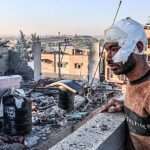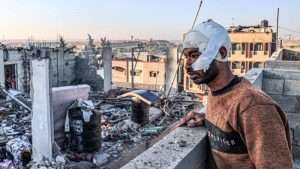
In a high-stakes operation under the cover of airstrikes, Israel successfully freed two hostages with dual Israeli-Argentinian nationality from captivity in Rafah, Gaza. The military action, which resulted in the death of 67 Palestinians, has sparked international concern over the escalating conflict and its humanitarian implications. The rescued hostages were reported to be in relatively good health despite their ordeal. Meanwhile, international voices, including U.S. President Joe Biden, have urged caution and a plan to ensure civilian safety in the conflict zone.
 In an early morning operation marked by complexity and danger, Israeli forces executed a precision raid in Rafah, a densely populated area in the Gaza Strip, to rescue two hostages held by Hamas. The operation, meticulously planned and carried out under the guise of intense airstrikes, has brought relief and jubilation over the successful return of Fernando Simon Marman, 60, and Louis Hare, 70, but also profound sorrow and outrage over the significant Palestinian civilian casualties reported by Gaza health officials.
In an early morning operation marked by complexity and danger, Israeli forces executed a precision raid in Rafah, a densely populated area in the Gaza Strip, to rescue two hostages held by Hamas. The operation, meticulously planned and carried out under the guise of intense airstrikes, has brought relief and jubilation over the successful return of Fernando Simon Marman, 60, and Louis Hare, 70, but also profound sorrow and outrage over the significant Palestinian civilian casualties reported by Gaza health officials.
The airstrikes, described by Israel’s military as necessary to facilitate the rescue and extraction of its forces, have once again highlighted the brutal toll of the ongoing conflict on Gaza’s civilian population. With 67 Palestinians killed in the raid’s aftermath, the international community has been quick to condemn the escalation and call for immediate de-escalation and protection for civilians.
The Israeli military attributed the necessity of the operation to the continued threat posed by Hamas, which it accused of initiating the conflict with a deadly incursion into southern Israel last October. The military’s statement underscored the delicate balance Israel claims to strike between conducting military operations against Hamas and minimizing civilian harm.
Critics, however, see the raid and accompanying airstrikes as a devastating blow to the already dire humanitarian situation in Gaza. With the enclave under blockade and facing severe shortages of basic necessities, the additional destruction and displacement have only exacerbated the suffering of its residents.
International reactions have been swift, with U.S. President Joe Biden expressing his concerns directly to Israeli Prime Minister Benjamin Netanyahu. Biden emphasized the need for Israel to have a credible plan to ensure the safety of civilians in Rafah, reflecting widespread fears of a humanitarian catastrophe should a full-scale ground invasion proceed.
As the dust settles on Rafah and the two rescued hostages begin their recovery, the broader conflict between Israel and Hamas remains unresolved. With each side holding firm to their positions and demands, the prospects for peace seem as distant as ever. The international community continues to grapple with the challenge of finding a path to a sustainable resolution, one that addresses the root causes of the conflict and ensures the safety and rights of all involved parties.
This complex and evolving story underscores the persistent tensions in the region and the urgent need for a renewed focus on diplomacy and humanitarian aid. As the world watches, the hope for a peaceful resolution remains, even as the reality on the ground points to a long and difficult road ahead.
